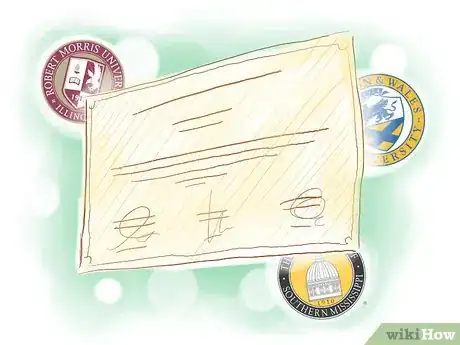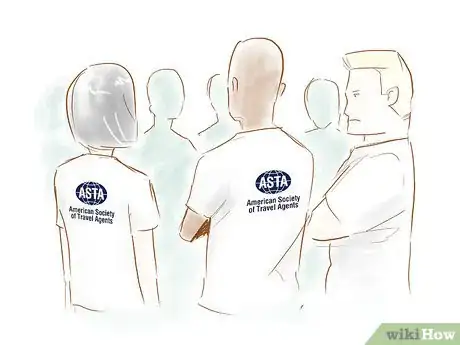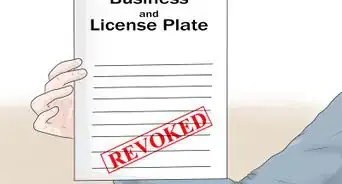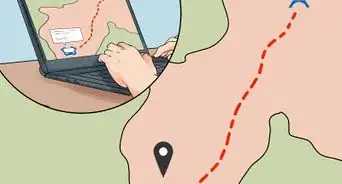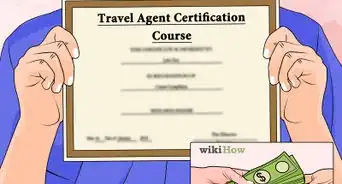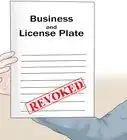This article was co-authored by Angela Rice. Angela Rice is a Luxury Travel Specialist and Co-Founder of Boutique Travel Advisors, a luxury travel advising business in Phoenix, Arizona. Angela specializes in consulting and curating highly customized and unique travel itineraries for clients seeking luxury, group, and multi-generational family travel. Angela studied at Arizona State University and The University of Iowa Tippie College of Business. She has prior consulting experience in accounting and business, which helps her run her business behind the scenes. Angela has been featured in The Washington Post, Reader's Digest, Travel Weekly, USA Today, Travel Market Report, Phoenix Magazine, and MSN. She is also a frequent guest on WBBM News Radio 105.9 FM's Travel Tuesday show.
wikiHow marks an article as reader-approved once it receives enough positive feedback. In this case, 100% of readers who voted found the article helpful, earning it our reader-approved status.
This article has been viewed 626,469 times.
Many people are attracted to a career as a travel agent because of the perks: discounts on lodging, transportation, and constant opportunities to see the world. They offer advice on travel, put together travel packages, research vacation spots and confirm arrangements. To be a travel agent, determine the skills you need, take advantage of educational opportunities and professional resources, and consider specializing in a particular type of travel.
Steps
Education and Training
-
1Get a high school diploma. Typical for any job nowadays, a high school diploma is necessary to get started. This is the bare minimum for entry into an established business.
- A GED is fine. Whichever form you choose, it's essential to get good grades and to learn computer skills.
-
2Take classes in travel planning. Having extra, focused knowledge makes you a prime candidate when you walk into any office (or start your own business).
- Check out your local community colleges, vocational schools, and industry associations for classes. The classes should focus on reservation systems, travel regulations (both domestic and international), and marketing.
Advertisement -
3Get a degree in travel and tourism. Few schools offer on-site degrees in this, but it's worth the research if one is in your area. However, loads offer classes online.
- University of Southern Mississippi
- Johnson & Wales University
- University of Massachusetts Isenberg School of Management
- East Carolina University
- Robert Morris University
- Strayer University
- If you plan to start your own travel agency, you will need business courses as well.
-
4Get a business license. Depending on your location and business set-up, you may need a travel agent license (if you have a host, you may be able to use their license number). Even if you don't live in an area that requires one but are planning to sell to residents of those states, it's worth looking into.
- 6 US states currently have seller of travel laws:
- California (the strictest and most complex)
- Florida
- Iowa
- Washington
- Hawaii
- Nevada (suspended until July 2013)
- Louisiana and Delaware have loose restrictions on new agencies.
- All agents and supervisors/managers in Ontario, Canada must take the Travel Industry Council of Ontario (TICO) exam. It currently rings up at $32 CAD.
- Travel agencies in British Columbia, Canada are required by the Insurance Council of British Columbia to take a travel insurance exam. It’s a license tied to the agency and every travel agent in the agency is required to attend 2 hours of training a year.
- The licensing for those in Saskatchewan, Canada is again related to travel insurance and involves an exam required by the Insurance Council of Saskatchewan. Unlike the licensing in British Columbia though, this license is tied to the travel agent, not the agency. Agents are required to attend 3 hours of training every year.[1]
- 6 US states currently have seller of travel laws:
-
5Get credentials. These generally take two forms; both add to your credibility as a travel agent.
- Classes and training at an undergrad level and your IATAN (International Airlines Travel Agent Network) ID card.
- Supplemental training at schools like The Travel Institute and the International Airline Transport Association’s Training and Development Institute. Both provide training and professional development opportunities for experienced travel agents. Examinations for different levels of certification are offered depending on a travel agent’s experience.[2]
- If you have a designated area of interest, certification from an organization such as the Cruise Lines International Association could never hurt.
- Beware of "card-mills." For a relatively small fee, they mysteriously give you a "travel agent qualification." It's a scam.
Skills and Know-how
-
1Develop the personality. To be a successful travel agent, you must be worldly, confident, and one heck of a networker. Even if you're working for a parent company, you have to convince your clients that you're offering them the best vacation they could possibly have.
- Be adventurous. Part of the job description is willing to scope out and analyze different, sometimes dangerous, sometimes exotic, areas.
- Hone your communication skills. When you're not doing on-the-scene research, you'll be behind a desk, emailing and talking on the phone. Your success rate is based on how well you can communicate.
- Zero-in on the details. Every person has a different ideal vacation—making sure everything from the curtains to the bus air conditioning system is beyond the standard is what makes a returning customer.
- Get organized. You'll be dealing with dozens of itineraries simultaneously. Keeping things straight and meeting deadlines is imperative to success.
- Make connections. You're going to need clients to make commission, so start talking. Be the go-to for all your friends and family when it comes to travel information and itinerary organization. Start networking today.
-
2Be well-traveled. You cannot sell a product that you're unfamiliar with. Getting out there or seeing it for yourself puts you in the clients' shoes and prepares you for unforeseen problems.
- Being able to dispense first-hand information is invaluable. Clients are more interested in hearing suggestions based on first-hand accounts of services, accommodations and geographic areas. This is the reason travel agents often receive discounts while traveling.
- Knowing a foreign language (or two) definitely helps!
-
3Know the facts. Before you start any career, familiarize yourself with the market and what you're getting into.
- The beginning travel agent makes, on average, around $15 an hour or around $30,000 a year.
- In the US as of 2010, there were 82,000 travel agents (a 10% rise is projected for 2020).
-
4Become a destination specialist. In order to thrive in this work environment, it's helpful to have an area of expertise. Have you wandered the markets of Istanbul? Cracked coconuts in the Mekong Delta? Choose a region that appeals to you.
- Some specialties could include a specific geographic location like Mexico; specific types of travel like cruises or tour groups; price-focused travel such as luxury accommodations or affordable vacations; and particular travel groups based on hobbies, special interests or lifestyles such as seniors or vegetarians.
-
5Pick your work environment. The number of travel agents working for themselves is increasing rapidly. Decide whether you want to work under the umbrella of a brick and mortar company or just through a host company, working on your own.
- YTB, Traverse, and GT Trends all give you a website that you call "your own" for a minimal fee. They train and support you and provide your initial income. They all have a parent company; if you'd like to cut out the middleman, you can pair with the parent company yourself. As always, do the research yourself to find what's right for you.
On the Job
-
1Apply for a job in a travel agency. Starting as a receptionist or assistant can lead to more responsibilities and opportunities to advance while you're enrolled in a travel agent program.
- Don't be afraid to just get your foot in the door. Some companies, like Virtuoso, recommend 20 years of experience before you start working with them.
-
2Start networking. Whether you're working from home or in an office, raising your voice is the only way to let people know you're getting on the ground and running. Do the research and start making offers.
- Create a referral service with another travel agent or agents who can refer business to you in your specialty and you can do the same for them. You can sometimes work out a mutual-referral agreement with another agent in order to collect referral fees.
-
3Join an organization. The quickest way to hone your craft is to observe and mirror other professionals in your field. Join an organization to surround yourself with similar individuals who may be a few years ahead of you.
- Professional organizations, such as the American Society of Travel Agents (ASTA) provide support, further education and training opportunities, resources, networking opportunities, travel tools, publication access, evaluation services, invitations to seminars, expos and summits, scholarships for students and salary tools.
- These organizations also give you access to job boards and travel school directories, if you're looking for career rejuvenation.
Expert Q&A
-
QuestionDo travel agents get to travel a lot?
 Angela RiceAngela Rice is a Luxury Travel Specialist and Co-Founder of Boutique Travel Advisors, a luxury travel advising business in Phoenix, Arizona. Angela specializes in consulting and curating highly customized and unique travel itineraries for clients seeking luxury, group, and multi-generational family travel. Angela studied at Arizona State University and The University of Iowa Tippie College of Business. She has prior consulting experience in accounting and business, which helps her run her business behind the scenes. Angela has been featured in The Washington Post, Reader's Digest, Travel Weekly, USA Today, Travel Market Report, Phoenix Magazine, and MSN. She is also a frequent guest on WBBM News Radio 105.9 FM's Travel Tuesday show.
Angela RiceAngela Rice is a Luxury Travel Specialist and Co-Founder of Boutique Travel Advisors, a luxury travel advising business in Phoenix, Arizona. Angela specializes in consulting and curating highly customized and unique travel itineraries for clients seeking luxury, group, and multi-generational family travel. Angela studied at Arizona State University and The University of Iowa Tippie College of Business. She has prior consulting experience in accounting and business, which helps her run her business behind the scenes. Angela has been featured in The Washington Post, Reader's Digest, Travel Weekly, USA Today, Travel Market Report, Phoenix Magazine, and MSN. She is also a frequent guest on WBBM News Radio 105.9 FM's Travel Tuesday show.
Luxury Travel Specialist You'd think they would, but a lot of times, you'll be so busy that you won't even have time to take days off! It really doesn't involve as much travel as people tend to think.
You'd think they would, but a lot of times, you'll be so busy that you won't even have time to take days off! It really doesn't involve as much travel as people tend to think. -
QuestionI am thinking I want to become a travel agent - what do I need to do? Are there any courses I need to take?
 Community AnswerYou could find information on the requirements online or from a school counselor. There are many courses that could prepare you for a career in that field.
Community AnswerYou could find information on the requirements online or from a school counselor. There are many courses that could prepare you for a career in that field. -
QuestionHow do I make money since anyone can book a flight and a hotel?
 Community AnswerOffer your clients custom tailored "bundles." Your service is to cut the stress and be an organizational resource to provide truly stress free travel.
Community AnswerOffer your clients custom tailored "bundles." Your service is to cut the stress and be an organizational resource to provide truly stress free travel.
Warnings
- Beware of travel scams that offer "certification" and a website from which to sell travel, in exchange for paying startup fees and recruiting other agents under you. Often these scammers offer "certification" from their own companies, not from professional institutions that are recognized by agencies in the industry. Most people lose time and money when they get involved with "instant travel agent" scams. In short, it's a pyramid scheme.⧼thumbs_response⧽
References
About This Article
To be a travel agent, try to travel as much as possible so you have first-hand experiences to share with your future clients. Also, work on improving your communication skills since you'll spend a lot of time sending emails and talking on the phone as a travel agent. If you want to learn more about the industry, see if there are any courses on travel planning being offered at your local community college or a nearby industry association. To learn about the educational requirements for becoming a travel agent, keep reading!


